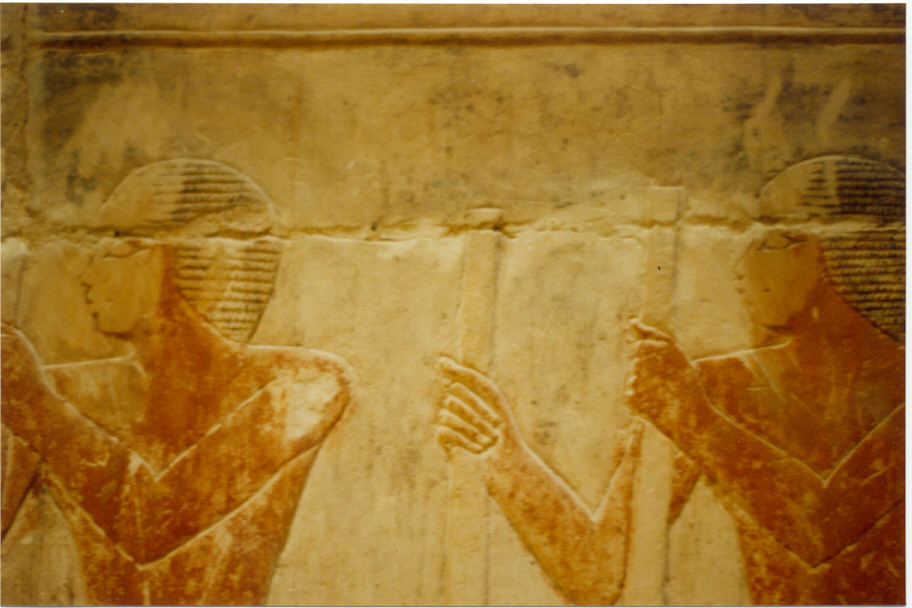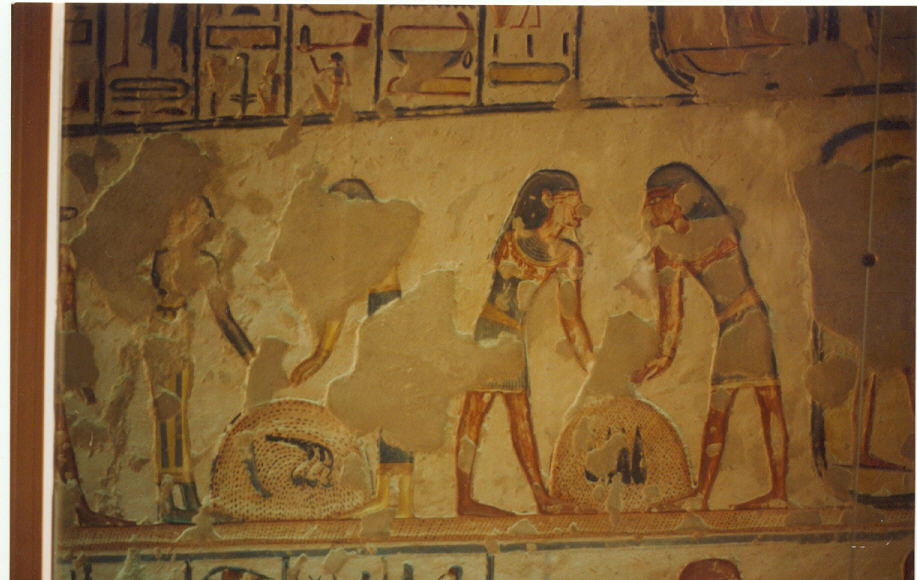THE VANISHING EVIDENCE OF
CLASSICAL
AFRICAN CIVILIZATIONS
Part II: The Tomb Evidence
Prof. Manu Ampim
In August/September 1995, I undertook my 3rd season of field research in Egypt and Nubia. I
conducted primary (first-hand) research at 15 sites in 1994 and 27 sites in 1995. As I indicated in part I of this
series, my work of documenting modern forgeries and studying ancient African social organization and spiritual culture was
superseded by the overwhelming problem of the rapid decay and deliberate destruction of many temple and tomb carvings.
The vanishing evidence of classical African civilizations is more apparent from the temple
evidence than from the tombs because the temple “conservation” work is obvious from the scaffolding, which is
visible from different locations within a temple. Not only does the scaffolding draw attention but the workmen’s equipment
and the broken up pieces of temple wall surface lying on the ground are also easily noticed. Whereas, when a tomb is under
“conservation,” the structure is usually closed to the public until the repair work and secret behind-the-scene
alterations are complete.
The altering of Black (African) facial features and the lightening of the skin colors of painted
reliefs inside the tombs are central aspects of the conspiracy to destroy the memory of classical African civilizations. The
two main conspirator groups carrying out these acts are European and American research teams, and local government workers.
Throughout Egypt and Nubia, the tomb images have suffered different levels of decay and destruction. In places such as Giza
the tombs are closed as there is little left to see; in Tell Amarna the tomb carvings are in an advanced state of decay; in
El Kab and Aswan many of the images have been systematically defaced; and in Beni Hassan only 4 of the 39 tombs are open because
the rest are badly damaged. The only major location which has escaped serious tomb damage is Sakkara, but this may not remain
true in the future because the conspirators’ work is not complete, until they have destroyed or defaced all the evidence
of classical African civilizations.

Modern conspirators have thoroughly erased the facial characteristics of these Black
images.
“EATING MUMMY”
In the tombs, not only have the faces of many wall images been altered or destroyed, but the
crimes against African mummies are almost beyond description. There is a tradition dating back to at least 1000 A.D. in which
Arabs and later Europeans engaged in the practice of “eating mummy.” This practice has been written about by a
number of authors, and it was widespread in modern Egypt and Western Europe. It consisted of countless ancient African mummies
being burned, ground up, and made into a kind of powder in order to be eaten. This incredible act of cannibalism was considered
an effective medical practice and folk remedy. The belief became widely prevalent that cures could be obtained by eating ground-up
preserved bodies. “Eating mummy” was considered effective in treating contusions, coughs, epilepsy, migraines,
ulcers, cases of poison, and as a general panacea.
Mummies or fragments of mummies were taken from their tombs and sent to Cairo and Alexandria,
where merchants sent the ground-up parts all over Western Europe. In the European Middle Ages and Renaissance mummy trafficking
was widespread. Egyptian mummies were so sought after that the chaplain to Queen Catherine de Medici of France made a special
trip to Egypt in 1549 and, together with some physicians from Italy, broke into a number of tombs around Sakkara in a quest
for mummies to use in various medicines. Catherine’s father-in-law, King Francis I of France, also carried ground-up
mummy in a pouch around his waist at all times in case of an emergency.
The mummy madness was such that if a genuine ancient Egyptian mummy was not available, local
Arabs would use the corpses of executed criminals or those who had died from disease. They used these modern substitutes to
meet the high demand for mummy powder, despite the protest against this barbaric practice by some physicians, among them the
French surgeon Ambroise Paré, who stated, “It causes great pain in their stomachs, gives them evil smelling breath and
brings about serious vomiting.”
“Eating Mummy” had a long and respectable tradition as a medicinal remedy. This
uncivilized European and Arab tradition of eating mummified human flesh was part of a flourishing trade and thus did not die
out until the 19th century! It is impossible to calculate the many thousands of African mummies that ended up in the stomachs
of Europeans and Arabs.
MODERN VIOLATIONS
The violation of African mummies has continued without hesitation in the form of local Arab
citizens and tomb “guardians” who hide mummies in a secluded location until they can find an adventurist tourist
who willing to pay and be taken to see a mummy or skeletal remains. I have seen extreme violations being carried out by Arabs
at various tomb sites. In one of the Khokka tombs on the West Bank of Waset (Luxor), I witnessed two Arabs go in a tomb and
take out the mummified parts of an 18th dynasty African official. They took him out of his burial place and savagely began
assembling the various parts: the lower legs, the upper legs, the torso, the head, and finally they took out the mummy’s
heart and asked me if I wanted to photograph it before they placed it inside of the chest area. All of this was done for “baksheesh”
(tip) with no regard for the African ancestor.
In many other cases, human bones have been scattered throughout the tomb, as well as broken
into small pieces and thrown about in the cemetery as the robbers are making off with the loot. The Arab villagers continue
to loot ancient tombs and sell the African artifacts in the illicit underground antiquities market.
The destruction of African mummies has led to a gross distortion of the historical facts. For
example, Dr. Wilfred Griggs and his colleagues of Brigham Young University (BYU) are in possession of an unparalleled thousands
of human DNA samples, many of them from the ancient Egyptians. Dr. Griggs recently gave a presentation in San Jose, California in which he discussed the joint BYU and Rosicrucian Museum mummy project. Griggs stated that the DNA tests that
were run on the Rosicrucian mummies indicated that of the 4 tested “not one of the four showed the African [genetic]
marker. Now that doesn’t surprise me,” he added, “because...there [were] many different races” in
Egypt. Griggs never gave any context for his remarks, as he did not mention the time period when each of these mummies lived.
Nor did he mention the geographical location where they lived within ancient Egypt, or where their burials were found. In
fact, Griggs’ motives are extremely questionable, because there was no balance in his statements. For example, Griggs
did not indicate if the DNA results showed either a “European” or “Asian” genetic marker. He only
made sure to state that the “African” marker was not found.

The facial damage to these four figures in a Valley of the Kings tomb is a typical
pattern
in the concerted effort to destroy Black images.
VALLEY OF THE KINGS
The main tomb work of the modern European and Arab conspirators has been on the West Bank of
Waset (Luxor), and in particular the Valley of the Kings, because this is the most popular tourist location within Egypt where
people go to see the ancient African tombs. The Valley of the Kings is well-known to travelers and Egyptologists as the principle
burial ground of the pharaohs of dynasties 18-20, and it is one of the most significant archaeological sites in the world.
The Kings Valley was intended as a quiet and secure resting place for African kings, but the artifacts in the area have suffered
greatly at the hands of plunderers, treasure hunters, antiquity dealers, Egyptologists, archeologists, and tourists. Of the
62 tombs in the Kings Valley, there is usually only about 9 tombs open [as of 1995]. The rest of the tombs are closed for
“conservation.”
Since many of these Kings Valley tombs were rediscovered in the 19th and early part of the 20th
century, they have fallen into disrepair. Many of them have permanently suffered from the steady pressure of thousands of
tourists each day, local Arab tomb-robbing villages such as Qurna, and from the destructive acts of archeologists and Egyptologists,
who are more concerned with gaining recognition in academic circles than with the welfare of the tombs. The result of all
this activity has been the African mummies being violated and destroyed, burial goods being sold or shipped off to museums,
paints chipping off the tomb walls, and the accumulation of salt crystals which have put the brilliantly colored reliefs in
a very fragile state.
BUILDING REPLICA TOMBS
The problem of deterioration of the Kings Valley (KV) tombs has led to a growing international
movement to build replica tombs and close the original structures. The tomb replication project will likely be implemented
in the future. Under this plan, the popular tombs which have suffered irreparable damage, such as the tomb of Tutankhamen,
will be permanently closed to the public. Once they are closed, the only persons who will have access to the original KV tombs
will be Egyptian government officials and workers, and “qualified” researchers.
The completion of this tomb replication project will be a major step in further erasing the
memory of a Black Egypt. These replica tombs, with the lightened colors and remade facial features, will graphically demonstrate
that the evidence of classical African civilizations is vanishing.
The tomb publications by Western scholars are currently a main source of information on tomb
decorations and details, and when some of the KV tombs are permanently closed these often inaccurate and unreliable publications
will unfortunately be the exclusive source of our information.
See part I of this series for recommendations on how you can help stop the vanishing evidence
of classical African civilizations.
Prof. Manu Ampim is a historian and primary researcher on African and African American culture & history.

